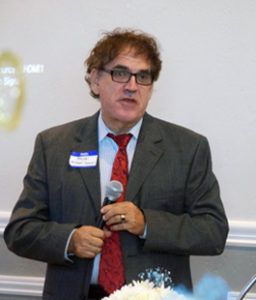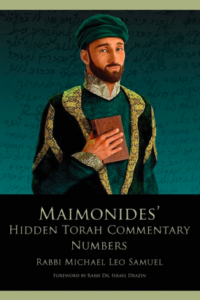By Rabbi Dr. Israel Drazin

BOCA RATON, Florida — Maimonides’ Hidden Torah Commentary: Numbers is the latest of the many brilliant, learned, eye-opening, easy-to-read, and easy-to-understand books by the brilliant scholar Rabbi Dr. Michael Leo Samuel. It is another one of his excellent contributions to scholarship.
San Diego County’s own Rabbi Samuel — currently the spiritual leader of Temple Beth Shalom in Chula Vista — was born in San Francisco and grew up in the Bay Area. He is the child of a Holocaust survivor; his late father, Leo Samuel, was descended from a long line of rabbis who lived in a part of Europe that used to be a section of Czechoslovakia. He is also a descendant of highly regarded rabbis of the 19th century, Rabbi Yisrael Salanter and Rabbi Yitzchak Elchanan. His rabbinical education benefited from studying at several Orthodox seminaries, graduating from the Lubavitch Seminary with advanced rabbinical degrees in Yoreh Deah, and an advanced rabbinical ordination, becoming a rabbinical judge (Yadin Yadin).
In the early years of his career, he taught Talmud and Bible at various Torah u’Messorah Day schools in New York and New England. Teaching at all levels and ages is one of his great passions. He became a pulpit rabbi in 1988, first serving an Orthodox congregation for several years, but later established his rabbinate within the Conservative tradition, where he has served for more than two decades. In 1995, he completed his doctoral degree in pastoral counseling at the San Francisco Theological Seminary.

He is an avid student of the Greek and Latin classics. His ideas combine those of Talmudic literature, Maimonides, Aristotle, Philo, Augustine, Thomas Merton, Levinas, Buber, Abraham Isaac Kook, Sigmund Freud, Carl Jung, Erich Fromm, Rashi, Nachmanides, and a legion of Jewish and non-Jewish classical Bible commentators. It has long been his personal belief that Judaism honors the great questions humankind has asked since the dawn of civilization. All traditions deserve to be questioned if they are to be correctly understood. He follows the teaching of Maimonides, “The truth is the truth no matter what its source.” His philosophy is simple: “We possess a wonderful tradition that reflects diversity and creativity. God did not place us in this world simply to be pious automatons. The human mind is a wonderful gift. To properly worship God, we must engage in critical thought and self-reflective thinking.”
This book completes his series of volumes in which he explains the views of Maimonides on what scripture writes in the 36 chapters of the fourth book, Numbers while comparing and contrasting Maimonides’ opinions with those of other thinkers. He focuses on the contents of each of the 10 parshas in Numbers, the 10 weekly biblical portions read in synagogues and studied at home.
 The following are samples of Rabbi Dr. Samuel’s incisive analysis of Numbers:
The following are samples of Rabbi Dr. Samuel’s incisive analysis of Numbers:
- He gives us information about the book’s name. The name “Numbers” derives from the Vulgate’s Numeri, which is a Latinization of the Greek Ἀριθμοί (Arithmoi). This name might have been chosen due to the numerous censuses in the wilderness (see Num. 1, 3-4, and 26). But the Hebrew name of the fourth book tells an altogether different story, בַּמִּדְבַּר (Bamidbar) —”In the Wilderness.” True to the book’s title, the ancient Israelite figures are predominantly concerned about the “numbers” of their ranks. Although the biblical text did not furnish details about how Moses conducted the process for his census of the Israelites, it is evident that he had to have several assistants who compiled the statistics of the Israelite army. In Numbers 11:16-18, Moses made use of the שֹׁטְרִים, who kept the records of the Israelite people. This term is related to the Akkadian verb sataru, implying record keepers or administrators. It has the sense of a civil servant. These individuals played a significant role in helping Moses and the priests maintain meticulous records of every event. Rabbi Samuel also gives us facts about the Hebrew name and its meaning for us today.
- In Numbers 12, Miriam, Moses’s sister, challenges Moses being God’s exceptional prophet. The text does not disclose what bothered Miriam. Was she only using Moses’ relationship with his wife as an excuse to assert her importance? It seems Miriam instinctively knows where to attack her brother, and she viewed his marital relationship as his Achilles’ heel. The fact she was dark-skinned apparently made her doubt her brother’s choice of spouse, but at the heart of her complaint aims to shatter Moses’ credibility as a prophet — as the preeminent prophet of God. Did she attack out of a sense of personal jealousy toward him?
- In Ch. 10 of his Epistle to the Jews of Yemen, Maimonides accepts the possibility of non-Jews attaining prophecy. Rabbi Samuel writes that Gersonides and others agreed: “Gersonides pointed out several instances of prophecy among non-Jews. God’s conversations with Noah were of a prophetic genre. The same applies to the three messengers who visited Abraham in Gen. 18, bearing the prediction of Isaac’s birth (CT, p. 26c). Similarly, the angelic messenger who rescued Hagar in Gen. 21:17 was also a prophet, according to Gersonides’ understanding of the story (CT, p. 30b). Gersonides also regarded Balaam as a genuine prophet — even though Balaam’s behavior demonstrated how non-Jews often misuse their prophetic gifts.”
- Maimonides states in his Guide of the Perplexed 3:23 that the Book of Job is a parable; Job never existed.
- There is a discussion about moderation which includes the obligation to enjoy what God made available. Maimonides stresses that people should follow the dictates of nature, eating, drinking, enjoying legitimate sexual intercourse, all in moderation, and living among people in honesty and uprightness, but not dwelling in the wilderness, in the mountains, or clothing themselves in garments of hair and wool, or afflicting the body. The Torah even warns us against these practices if we interpret it according to what tradition tells us is the meaning of the passage concerning the Nazirite, “And he (the priest) shall make an atonement for him because he has sinned against the soul.” The Sages wondered, “Against what soul has he sinned? Against his soul because he has deprived himself of wine. Is this not then a conclusion a minori ad majus? If one deprives himself merely of wine must bring an atonement, how much more incumbent is it upon one who denies himself every enjoyment.”
- Samuel writes: “Maimonides teaches us a cardinal rule in how we understand the Torah: Torah never contradicts a fact. When we find ourselves in a situation where Torah and science appear adversarial to one another regarding a fact, there are only two alternatives to consider—either the scientific view is incorrect, or we must reinterpret the Torah in a manner that is in harmony with reality.”
- Maimonides teaches that it is not proper for a man to accept as trustworthy anything other than one of these three things. The first is a thing for which there is clear proof from man’s reasoning, such as arithmetic, geometry, and astronomy. The second is what a man perceives through one of the five senses: when he knows with certainty that this is red and black. The third is what man receives from the prophets or the righteous. Every reasonable man ought to distinguish in his mind and thought all the things that he accepts as trustworthy and say, “This I accept as trustworthy because of tradition and this because of sense-perception and this on grounds of reason.” Anyone who accepts as trustworthy anything that is not of these three species of him, it is said, “The simple believes everything” (Prov. 14: 15).
- Maimonides taught that while the laws of the Torah derive from a divine origin — in contrast with the social laws defined by society — every effort ought to be expended to understand the law’s rational purpose and inner conceptual structure. But such an intellectual approach to the observance of the mitzvot did not sit well with the traditionalist camp. Not only did they reject this exposition because of their disdain toward rationalistic thought, but they also felt that rationalism could ultimately undermine religious faith and behavior altogether.
- Maimonides recognizes that humans are imperfect, even Moses. Numbers 20:10-12 tells how Moses and Aaron gathered the Israelite assembly before a rock and, angered by their failure to maintain trust in God, said to them, “Listen, you rebels, shall we bring water for you out of this rock?” Then Moses lifted his hand and struck the rock twice with his staff; the water came out abundantly, and the congregation and their livestock drank — But the Lord said to Moses and Aaron, “Because you did not trust in me, to show my holiness before the eyes of the Israelites, therefore you shall not bring this assembly into the land that I have given them.” Rabbi Samuel explains: “For Maimonides, Moses’ sharp censure – ‘listen you rebels…’ – reflects an inappropriately angry tone that caused a “chillul Hashem” (a desecration of God’s Name and acts in a manner most unbecoming of a person of his stature.”
- In three excurses, Rabbi Samuel explores and clarifies the ancient and medieval opinions concerning the unusual story of the non-Israelite prophet Balaam, including why it is inserted in Jewish scripture in such detail and what it is meant to inform us. In the second, he addresses the oft-raised question of whether God is speaking to all humanity in the Torah or exclusively to Jews. In the third, he focuses on the role of women in Jewish law.
This is just some of the information and a few of the many interpretations Rabbi Samuel gives readers in his splendid, highly informative book.
*
Rabbi Dr. Israel Drazin is a retired brigadier general in the U.S. Army chaplain corps and the author of more than 50 books.